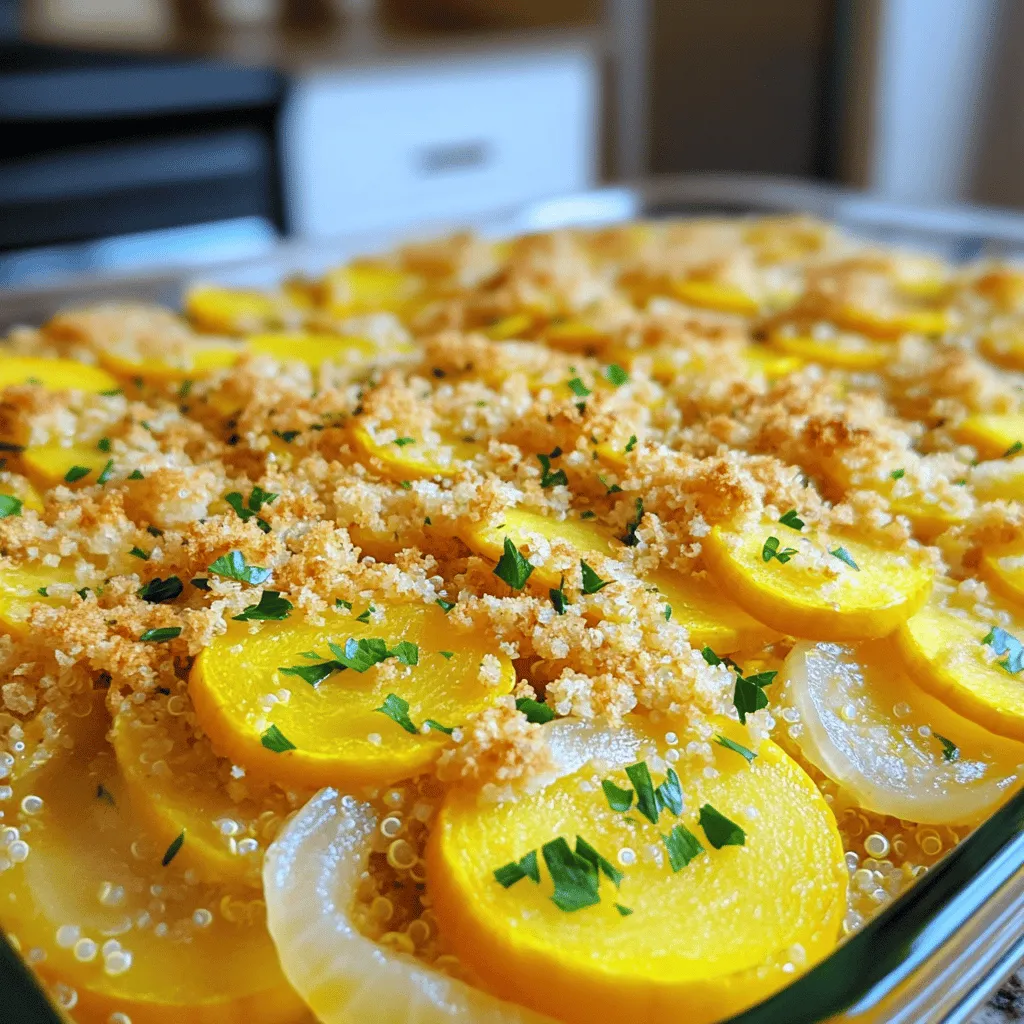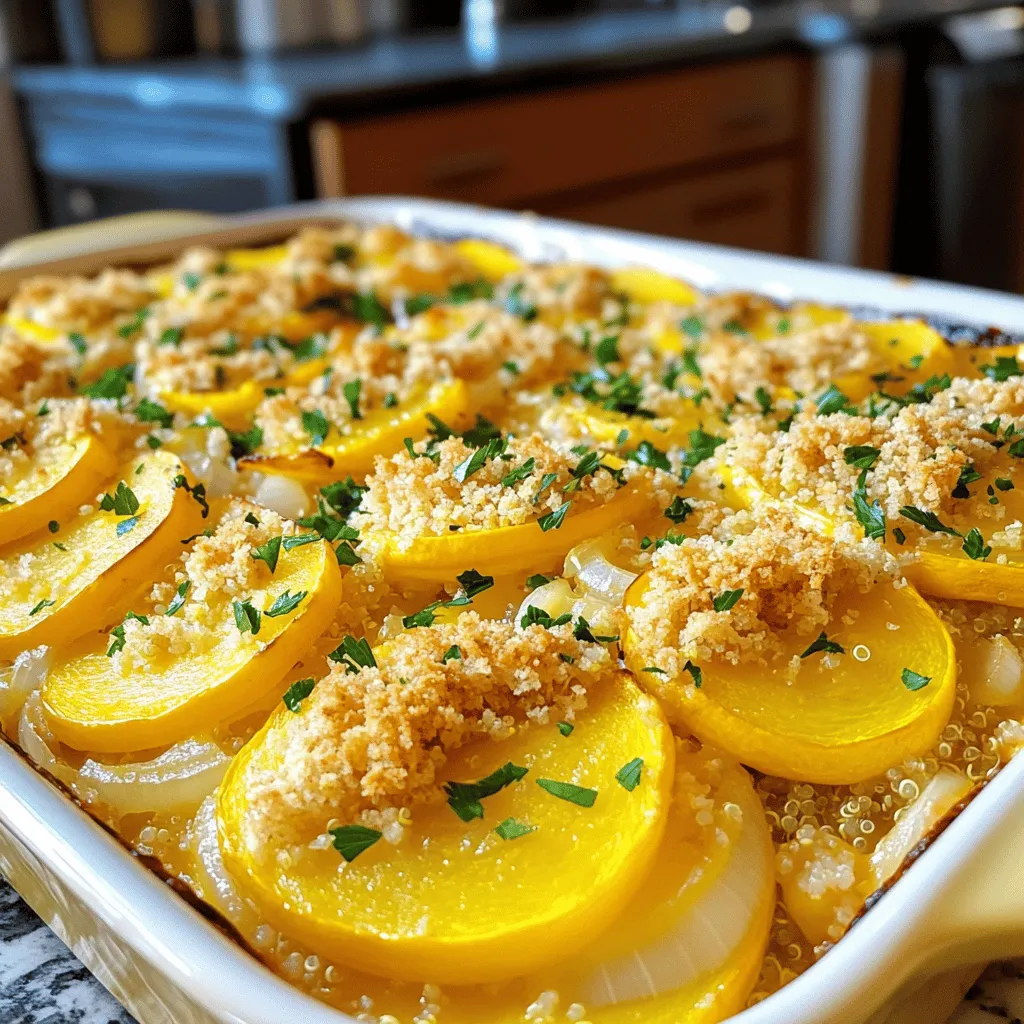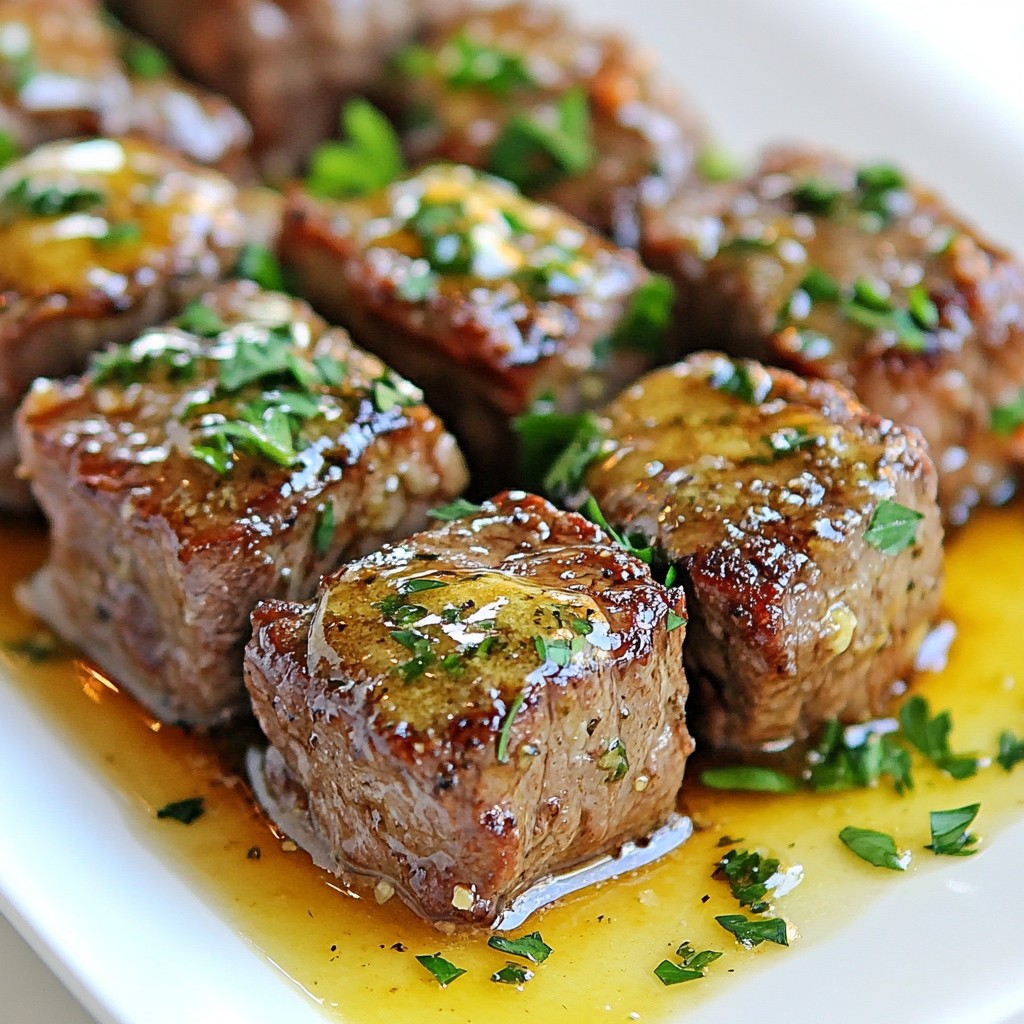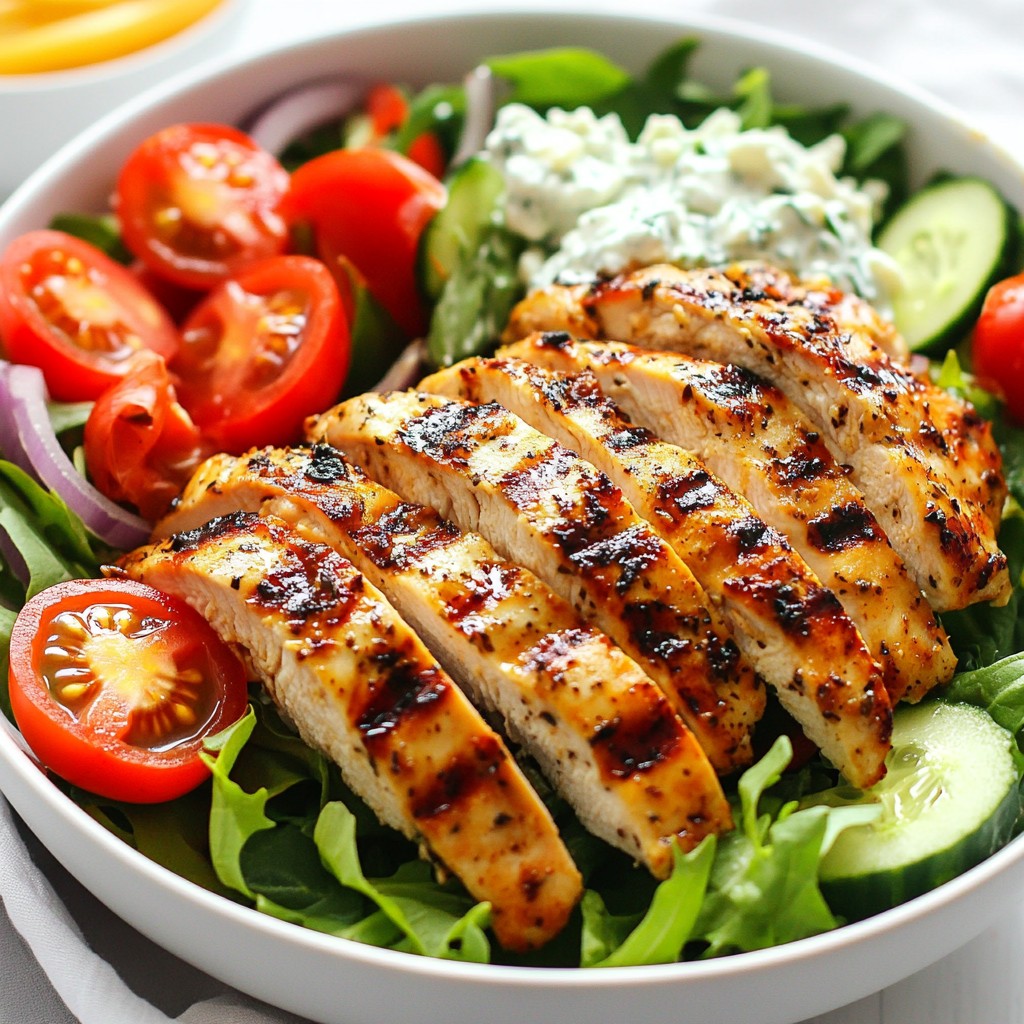If you’re looking for a warm, comforting dish to brighten your dinner table, look no further! My Yellow Squash Casserole blends fresh squash, cheese, and spices to create a wholesome meal. It’s easy to make and packed with flavor. Whether you’re a busy parent or a cooking novice, this recipe is perfect for you. Let’s get started on making a dish that brings everyone together!
Ingredients
List of Key Ingredients
– 4 medium yellow squashes, sliced
– 1 onion, finely chopped
– 2 cloves garlic, minced
– 1 cup cooked quinoa
– 1 cup shredded cheese (cheddar or a blend)
– 1/2 cup sour cream
– 1/2 cup milk
– 2 large eggs
– 1 teaspoon salt
– 1/2 teaspoon black pepper
– 1/2 teaspoon paprika
– 1 cup breadcrumbs (for topping)
– 2 tablespoons olive oil
– Fresh parsley, chopped (for garnish)
The main stars of this dish are yellow squashes. They bring a sweet taste and soft texture. I love how they absorb the flavors of the other ingredients.
Onions and garlic add a warm base. Sautéing them in olive oil makes the kitchen smell amazing.
Quinoa adds a nice protein boost. It keeps the casserole filling and nutritious. The cheese, whether cheddar or a mix, brings creaminess and flavor.
Sour cream and milk create a rich, smooth mix. The eggs bind everything together, giving the casserole its structure.
Seasoning is key. Salt, black pepper, and paprika add just the right kick.
The breadcrumbs on top are the final touch. They provide a crunchy layer that contrasts with the soft filling.
Optional Ingredients for Variations
– Different cheese options (mozzarella, feta)
– Add-ins like bell peppers or mushrooms
Feel free to switch up the cheese. Mozzarella gives a milder taste, while feta adds a tangy kick. Adding bell peppers or mushrooms can enhance the flavor and texture.
Nutritional Information
This casserole is not just tasty; it’s also good for you. Each serving has around 250 calories. It contains healthy fats, protein, and fibers. Enjoy a hearty meal that satisfies both your taste buds and your health goals!
Step-by-Step Instructions
Preparation Steps
– Preheat the oven to 350°F (175°C).
– In a large skillet, heat 2 tablespoons of olive oil over medium heat. Add 1 finely chopped onion and sauté for 3-4 minutes until soft.
– Add 2 minced garlic cloves to the skillet. Cook for 1 minute until fragrant.
– Stir in 4 sliced yellow squashes and sauté for 5-7 minutes until slightly soft. Remove from heat and set aside.
Casserole Assembly
– In a large bowl, mix the sautéed squash with 1 cup of cooked quinoa, 1 cup of shredded cheese, 1/2 cup sour cream, 1/2 cup milk, 2 large eggs, 1 teaspoon salt, 1/2 teaspoon black pepper, and 1/2 teaspoon paprika.
– Stir until everything is well combined.
– Transfer the mixture to a greased 9×13-inch casserole dish, spreading it evenly.
Baking Instructions
– Mix 1 cup of breadcrumbs with 1 tablespoon of olive oil. Sprinkle this topping evenly over the casserole.
– Bake in the preheated oven for 25-30 minutes until the top is golden brown and bubbly.
– Let it cool for about 5 minutes. Garnish with fresh chopped parsley before serving.
Tips & Tricks
Perfecting the Texture
To get the best texture, avoid overcooking the squash. Cook it until it’s tender but still firm. This keeps the squash from becoming mushy in the casserole. A little crunch adds great flavor and bite.
For a creamy casserole, mix ingredients well. Use sour cream and milk to create a rich texture. Eggs also help bind everything together. When you bake it, the mix will set perfectly without losing creaminess.
Meal Prep Suggestions
Preparing ingredients in advance can save time. Chop the squash, onion, and garlic the night before. Store them in the fridge. This way, you can whip up your casserole quickly.
If you have leftovers, freezing is a great option. Let the casserole cool completely before freezing. Use a tight container to keep it fresh. When you want to eat it, thaw in the fridge overnight before baking.
Serving Suggestions
This casserole pairs well with a fresh salad on the side. A light cucumber or tomato salad adds a nice crunch.
For drinks, consider serving iced tea or lemonade. Both drinks balance the savory flavors of the casserole. They also keep things refreshing, especially in warm weather.

Variations
Dietary Modifications
You can easily make this dish fit your diet. For gluten-free options, swap out the breadcrumbs. Use gluten-free breadcrumbs or crushed nuts for a crunchy topping. If you want a dairy-free casserole, you can replace cheese and sour cream with plant-based versions. Almond or cashew cheese works well. For sour cream, try coconut yogurt or cashew cream.
Flavor Enhancements
To boost flavor, think about adding herbs and spices. Fresh basil, thyme, or rosemary can brighten the dish. You can also add a pinch of red pepper flakes for some heat. Want to turn this into a heartier meal? Add proteins like shredded chicken or cooked beans. These additions will make your casserole more filling.
Seasonal Variations
In summer, swap yellow squash with zucchini for a fresh twist. Zucchini adds a nice texture and flavor. During fall, try using pumpkin. You can mix pumpkin puree into the casserole for a warm, cozy dish. This seasonal spin makes each bite feel special while keeping the comfort of the classic recipe.
Storage Info
Refrigeration Guidelines
To store your Yellow Squash Casserole, let it cool first. Place it in an airtight container. This will keep it fresh for up to three days in the fridge. When you want to reheat it, set your oven to 350°F (175°C). Cover the dish with foil to keep it moist. Bake for about 20 minutes or until heated through.
Freezing Recommendations
If you want to freeze your casserole, use a freezer-safe container. Glass or plastic containers work well. You can also use a heavy-duty freezer bag. Make sure to remove as much air as possible. This helps prevent freezer burn. When you’re ready to eat it, take it out a day before. Place it in the fridge to thaw. After it’s thawed, bake at 350°F (175°C) for 30-35 minutes.
Shelf Life Information
In the fridge, your Yellow Squash Casserole lasts for about three days. If frozen, it can stay good for up to three months. Just remember to label it with the date you froze it. This will help you keep track of how long it has been stored.
FAQs
Common Questions
Can I use yellow squash instead of zucchini?
Yes, you can use yellow squash. They have a similar taste and texture. Yellow squash adds a lovely color and sweetness to your casserole.
How can I make this recipe ahead of time?
You can prepare the casserole one day before baking. Just cover it and store it in the fridge. When ready, bake it straight from the fridge. You might need to add a few extra minutes to the baking time.
What can I substitute for quinoa in this dish?
If you prefer, you can use rice or couscous. Both add nice texture and flavor. Just cook them before mixing with other ingredients.
Troubleshooting Tips
What to do if the casserole is too watery?
If the casserole is watery, try baking it a bit longer. This helps evaporate excess moisture. You can also drain some liquid before mixing the ingredients.
Fixing burned tops or uneven cooking
If the top burns, you can cover it with foil while baking. This stops further browning. To fix uneven cooking, check the oven temperature. Sometimes, it can be too hot or cold.
Ingredient Substitutions
Alternatives for fresh ingredients
You can use frozen yellow squash if fresh is not available. Just thaw and drain excess water before using. For the onion and garlic, you can use onion powder and garlic powder.
Vegan options for eggs and dairy
For eggs, try using flax eggs or applesauce. For dairy, use almond milk and vegan sour cream. These swaps keep the dish creamy and delicious without animal products.
This blog post detailed a tasty squash casserole recipe. You learned about key ingredients, from yellow squashes and quinoa to cheese options. I shared steps to prepare and bake the dish, along with valuable tips to enhance texture and flavor. We explored variations for dietary needs and even discussed how to store leftovers.
In the end, this casserole recipe is not just simple; it’s adaptable and fun. Enjoy making this dish your own!




